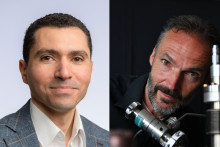Compassionate technology
University of Twente is starting a new research project ‘Designing compassionate technology with high societal readiness levels for mental healthcare’. It has received a funding from NWO (Dutch Research Council) and will kick-off this spring. It is done in collaboration with public and private partners Dimence Groep and Mind district.
It is coordinated by Matthijs Noordzij, Associate Professor at the Department of Psychology, Health & Technology (BMS Faculty). The team includes UT researchers from various disciplines: Geke Ludden (Interaction Design), Gerben Westerhof and Saskia Kelders (Psychology), Randy Klaasen (Human Media Interaction) and Peter-Paul Verbeek (Philosophy).
‘A million patients. There is a lot of suffering,’ says Matthijs Noordzij, UT scientist and the coordinator of the new research project. What these patients truly need is compassion, he continues. ‘Compassion is defined as a sensitivity to people’s suffering and taking action to alleviate it. Which is precisely why people go to mental healthcare. It is not like a broken leg. When you have suddenly lost your partner or parent and are not able to work anymore you don’t just want a fast and effective fix of your health issue. You need a compassionate solution. But the mental healthcare technology currently seems more focused on efficiency.’
‘It is not like a broken leg’
Hence the new research. ‘There has been a lot of technology developed to help mental healthcare patients,’ says Noordzij. ‘The technology is working well, but many people aren’t fully ready to use it – so it is not really working. That is why we need to rethink the way we design e-mental health solutions.’
Third wheel
Why the resistance to the existing solutions? ‘To use them, you need to change your way of working,’ explains Saskia Kelders. ‘That means introducing another partner to the equation. Suddenly the therapy needs to include the patient, the counselor and the technology. Originally the idea was that using technology, such as web-based platforms or mobile apps, would magically mean less work for the therapist. But that is not the case.’
That is why the scientists believe we need design centered around human values, specifically compassion. They will begin by rethinking the design methodology and aim to develop ‘compassionate technology’. What exactly does that refer to? ‘That is what we need to find out. It is a new term,’ says Noordzij.
Inclusive and sustainable
Although the specifics are yet unclear, the ultimate goal of the project is to come up with technology that is able to improve quality and access to mental healthcare. ‘We hope it will make mental healthcare more inclusive and sustainable,’ says Kelders. ‘There is a lot of stigma surrounding mental health, so people sometimes don’t want to visit a counselor. In other parts of the world, physical distance is also an issue. It would therefore make is easier if technology becomes a widely accepted part of therapy.’







